Related Research Articles

The Weimar Republic, officially known as the German Reich, was a historical period of Germany from 9 November 1918 to 23 March 1933, during which it was a constitutional federal republic for the first time in history; hence it is also referred to, and unofficially proclaimed itself, as the German Republic. The period's informal name is derived from the city of Weimar, which hosted the constituent assembly that established its government. In English, the republic was usually simply called "Germany", with "Weimar Republic" not commonly used until the 1930s. The Weimar Republic had a semi-presidential system.

Maximilian, Margrave of Baden, also known as Max von Baden, was a German prince, general, and politician. He was heir presumptive to the throne of the Grand Duchy of Baden, and in October and November 1918 briefly served as the last chancellor of the German Empire and minister-president of Prussia. He sued for peace on Germany's behalf at the end of World War I based on U.S. President Woodrow Wilson's Fourteen Points and took steps towards transforming the government into a parliamentary system. As the German Revolution of 1918–1919 spread, he handed over the office of chancellor to SPD Chairman Friedrich Ebert and unilaterally proclaimed the abdication of Emperor Wilhelm II. Both events took place on 9 November 1918, marking the beginning of the Weimar Republic.
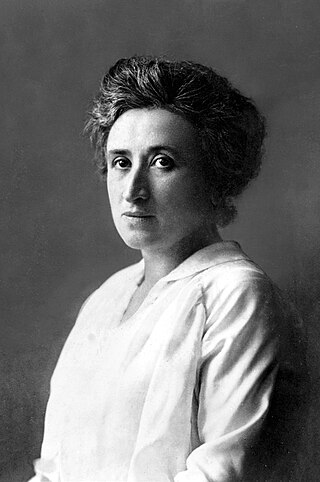
Rosa Luxemburg was a Polish and naturalised-German revolutionary socialist, orthodox Marxist, and anti-War activist during the First World War. She became a key figure of the revolutionary socialist movements of Poland and Germany during the late 19th and early 20th century, particularly the Spartacist uprising.

The Communist Party of Germany was a major far-left political party in the Weimar Republic during the interwar period, an underground resistance movement in Nazi Germany, and a minor party in West Germany during the postwar period until it was banned by the Federal Constitutional Court in 1956.

Council communism or Councilism is a current of communist thought that emerged in the 1920s. Inspired by the November Revolution, council communism was opposed to state socialism and advocated workers' councils and council democracy. It is regarded as being strongest in Germany and the Netherlands during the 1920s.

Philipp Heinrich Scheidemann was a German politician of the Social Democratic Party of Germany (SPD). In the first quarter of the 20th century he played a leading role in both his party and in the young Weimar Republic. During the German Revolution of 1918–1919 that broke out after Germany's defeat in World War I, Scheidemann proclaimed a German Republic from a balcony of the Reichstag building. In 1919 he was elected Reich Minister President by the National Assembly meeting in Weimar to write a constitution for the republic. He resigned the office the same year due to a lack of unanimity in the cabinet on whether or not to accept the terms of the Treaty of Versailles.

The German revolution of 1918–1919, also known as the November Revolution, was an uprising started by workers and soldiers in the final days of World War I. It quickly and almost bloodlessly brought down the German Empire, then, in its more violent second stage, the supporters of a parliamentary republic were victorious over those who wanted a Soviet-style council republic. The defeat of the forces of the far left cleared the way for the establishment of the Weimar Republic. The key factors leading to the revolution were the extreme burdens suffered by the German people during the war, the economic and psychological impacts of the Empire's defeat, and the social tensions between the general populace and the aristocratic and bourgeois elite.
Hede Tune Massing, née "Hedwig Tune", was an Austrian actress in Vienna and Berlin, communist, and Soviet intelligence operative in Europe and the United States during the 1930s and 1940s. After World War II, she defected from the Soviet underground. She came to prominence by testifying in the second case of Alger Hiss in 1949; later, she published accounts about the underground.
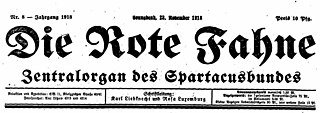
Die Rote Fahne was a German newspaper originally founded in 1876 by Socialist Worker's Party leader Wilhelm Hasselmann, and which has been since published on and off, at times underground, by German Socialists and Communists. Karl Liebknecht and Rosa Luxemburg famously published it in 1918 as organ of the Spartacus League.
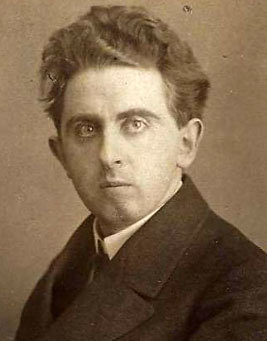
Albert Ehrenstein was an Austrian-born German Expressionist poet. His poetry exemplifies rejection of bourgeois values and fascination with the Orient, particularly with China.

The Council of the People's Deputies was the provisional government of Germany during the first part of the German Revolution, from 10 November 1918 to 13 February 1919. Formed initially by three members each from Germany's two main socialist parties, it shaped the transition from the Empire to the Weimar Republic.

Rudolf Leonhard was a German author and communist activist.

Georg Gradnauer was a German newspaper editor and politician for the Social Democratic Party of Germany (SPD), and the first elected Minister-President of Saxony following the end of the monarchy.
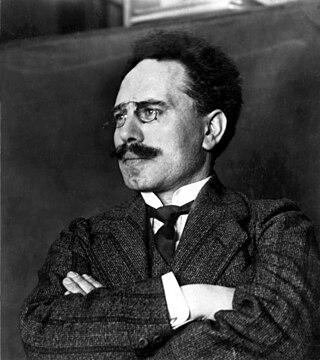
Karl Paul August Friedrich Liebknecht was a German revolutionary socialist and anti-militarist. A member of the Social Democratic Party of Germany (SPD) beginning in 1900, he was one of its deputies in the Reichstag from 1912 to 1916, where he represented the left-revolutionary wing of the party. In 1916 he was expelled from the SPD's parliamentary group for his opposition to the Burgfriedenspolitik, the political truce between all parties in the Reichstag while the war lasted. He twice spent time in prison, first for writing an anti-militarism pamphlet in 1907 and then for his role in a 1916 antiwar demonstration. He was released from the second under a general amnesty three weeks before the end of the First World War.
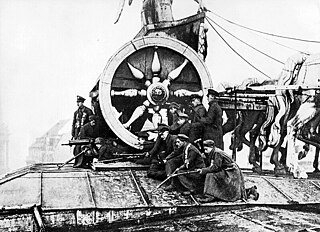
The Spartacist uprising, also known as the January uprising or, more rarely, Bloody Week, was an armed uprising that took place in Berlin from 5 to 12 January 1919. It occurred in connection with the German revolution that broke out just before the end of World War I. The uprising was primarily a power struggle between the supporters of the provisional government led by Friedrich Ebert of the Majority Social Democratic Party of Germany (MSPD), which favored a social democracy, and those who backed the position of the Communist Party of Germany (KPD) led by Karl Liebknecht and Rosa Luxemburg, which wanted to set up a council republic similar to the one established by the Bolsheviks in Russia. The government's forces were victorious in the fighting.

The Spartacus League was a Marxist revolutionary movement organized in Germany during World War I. It was founded in August 1914 as the International Group by Rosa Luxemburg, Karl Liebknecht, Clara Zetkin, and other members of the Social Democratic Party of Germany (SPD) who were dissatisfied with the party's official policies in support of the war. In 1916 it renamed itself the Spartacus Group and in 1917 joined the Independent Social Democratic Party of Germany (USPD), which had split off from the SPD as its left wing faction.
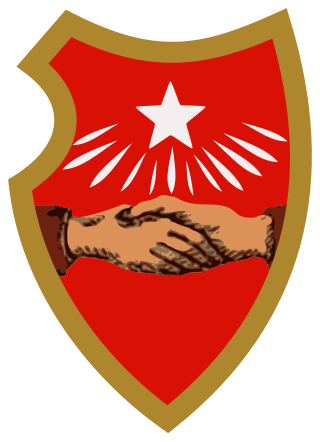
The Independent Social Democratic Party of Germany was a short-lived political party in Germany during the German Empire and the Weimar Republic. The organization was established in 1917 as the result of a split of anti-war members of the Social Democratic Party of Germany (SPD), from the left of the party as well as the centre and the right. The organization attempted to chart a course between electorally oriented reformism on the one hand and Bolshevist revolutionism on the other. After several splits and mergers, the last part of the organization was terminated in 1931 through merger with the Socialist Workers' Party of Germany (SAPD).
Albert Schreiner was a German political activist and Marxist historian.

Karl Otten was a German expressionist writer and broadcaster.

The Bremen Soviet Republic, also translated as the Bremen Council Republic, was an unrecognised revolutionary state in Germany formed during the German revolution of 1918–1919 in the immediate aftermath of the First World War. Although not formally declared until 10 January 1919, the regime it represented presided in the industrial port city of Bremen from 14 November 1918 until its suppression on 4 February 1919 by army and irregular forces engaged by the provisional revolutionary government in Berlin.
References
- ↑ Taylor, Seth (1990). Left-Wing Nietzscheans: The Politics of German Expressionism 1910-1920. Berlin: Walter de Gruyter. p. 220.
- ↑ Pervulescu, Constantin (2006). After the Revolution: The Individualist Anarchist Journal "Der Einzige" and the Making of the Radical Left in the Early Post-World War I Germany (PhD thesis). University of Minnesota. p. 28.
- ↑ Ehrenstein, Albert (2004). Aufsätze und Essays. Gottingen: Wallstein Verlag.